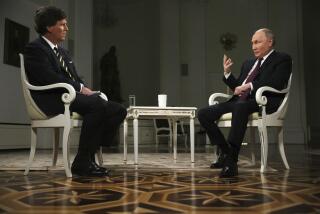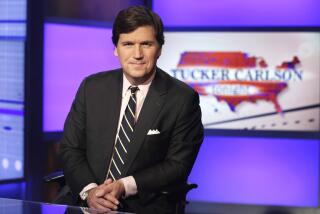Newsman Takes Walk, Bumps Into Gorbachev
- Share via
NEW YORK — A funny thing happened to Dan Rather on his way across the Kremlin Tuesday--he ran into Soviet leader Mikhail Gorbachev and interviewed him.
Last December, Rather had to watch as NBC’s Tom Brokaw had an exclusive one-hour interview with Gorbachev. Prior to the December summit, the Kremlin rejected a CBS request for a Rather-Gorbachev interview. The nyet prompted the network to claim the interview had been nixed because of CBS’ coverage of Afghanistan, as well as a human rights question Rather had asked Gorbachev during a press conference three years ago.
Tuesday, Rather unexpectedly got his exclusive interview. No matter that it only lasted about three minutes.
“We were out in the Kremlin, just walking around looking for shots, for things to happen,” Rather said in a telephone interview from Moscow.
They spotted a big car coming toward them and CBS cameraman Yurgen Norman--whom Rather called one of the most experienced in the world--said, “I think that’s Gorby’s car.”
“You can’t be sure because it looked like just another long Soviet limo with dark windows,” Rather said. “Then the KGB guy who had staked us out stepped between our camera lens and the car. Norman winked at me as if to say, ‘It’s got to be him or this guy wouldn’t be making this move.’ ”
Rather and crew stuck around the area, hoping to catch another glimpse of the car, but eventually gave up and headed across the Kremlin for Cathedral Square.
Suddenly David Buksbaum, CBS News vice president and director of special events, pointed and said, “That’s Gorbachev’s car and he’s going to get out.”
“Frankly, I didn’t immediately believe him,” Rather said. “But he was getting out. We sprinted about 50 yards as he was getting out of the car to talk to a mixed group of tourists, Americans and Soviets. The Fresno, Calif., opera group was among them.”
Rather and the CBS crew tried to make their way toward Gorbachev and his security people resisted.
“They were giving us some pretty strong elbows,” Rather said.
That’s when Buksbaum stepped in, pushing back at the security men to draw their attention, leaving a hole that Rather could get through, following behind a woman and her son, a Young Pioneer--which is like the Soviet version of the Boy Scouts.
When he got within about 2 1/2 feet of Gorbachev, Rather waited for him to finish a conversation.
Then he stuck out his hand, introduced himself and mentioned that they had seen each other during the Washington summit.
“There was a slight pause and he looked me in the eye,” Rather said. “That’s one thing about Gorbachev--he locks eyes with everybody. He locked onto my eyes, there was a flicker of recognition, he stuck out his hand and said something in Russian.”
The problem was, neither Rather nor Gorbachev had a translator present. Gorbachev looked around and said something in Russian, which Rather learned later was, “Who’s going to translate this?”
Rather said he spotted a vaguely familiar face--a man he thought might be a college professor--and said, “How about this fellow?”
The man was Alexander Yakovlev, Gorbachev’s right-hand man in the Politburo, who somewhat reluctantly agreed to translate.
“From that point on,” Rather said, “it was a pretty standard interview situation.”
In what Rather called the nanoseconds during which he was approaching Gorbachev, his thoughts ranged from “Boy, oh, boy, this is really good luck” to “If we go on another few seconds without a translator, this will be gone south--or maybe east.”
Rather called Gorbachev a younger, Soviet cross between former House Speaker Tip O’Neill and Ronald Reagan--with O’Neill’s “precinct political savvy and Reagan’s sense of the camera and symbolism and dramatics and PR.”
“Our meeting with him was partly our own hustle and staying alert and just being in the right place at the right time--but he knew what he was doing, coming to visit with those tourists. He’s trying to signal everybody that this openness is here, there’s something to it and he’s not hard to talk to,” Rather said.
“Western civilization would survive, whether we got this interview or not. But it was a nice thing, a nice thing. My late father used to say, in terms of having good things happen, ‘If there’s lightning about, one should at least be a tree.’ ”
More to Read
Sign up for Essential California
The most important California stories and recommendations in your inbox every morning.
You may occasionally receive promotional content from the Los Angeles Times.













